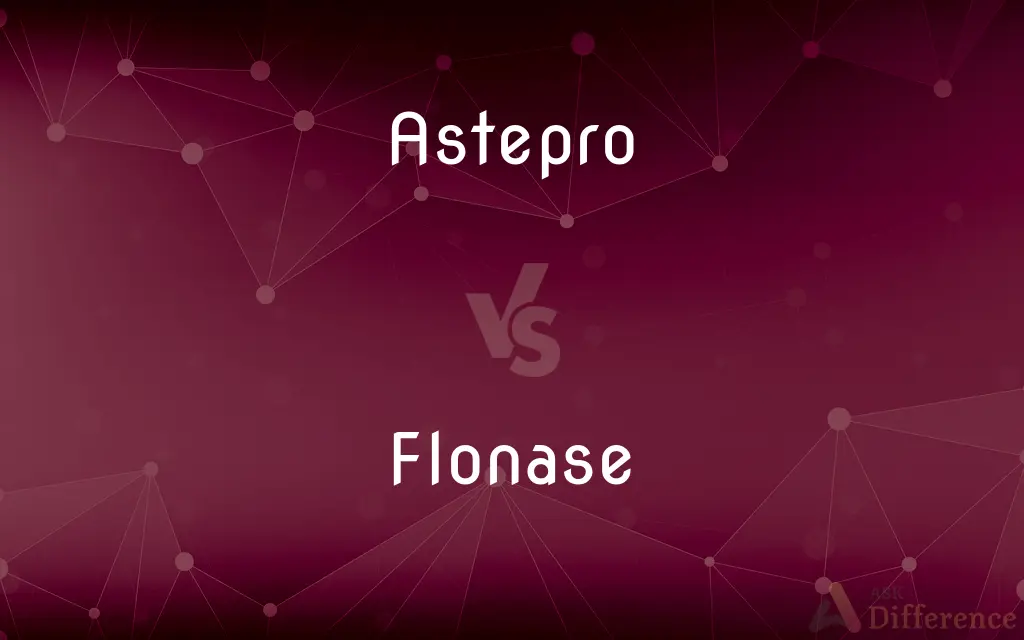Astepro vs. Flonase — What's the Difference?
By Maham Liaqat & Urooj Arif — Published on February 27, 2024
Astepro is an antihistamine nasal spray used for allergy relief without a prescription, while Flonase is a corticosteroid spray for treating allergic and non-allergic nasal symptoms, available both OTC and by prescription.

Difference Between Astepro and Flonase
Table of Contents
ADVERTISEMENT
Key Differences
Astepro (azelastine) targets the histamine receptors in the nasal passages, effectively blocking the histamine that causes allergy symptoms like runny nose, sneezing, and itching. It's known for its quick action, often providing relief within minutes, and is suitable for adults and children, with specific age recommendations depending on the product formulation.
Flonase (fluticasone propionate) works by reducing inflammation in the nasal passages, addressing a broader range of symptoms, including nasal congestion, which antihistamines like Astepro may not directly treat. Flonase is available in different strengths, with the over-the-counter version (Flonase Allergy Relief) and prescription versions (such as Flonase Sensimist for children) catering to various needs.
Astepro is specifically designed for rapid relief from allergic reactions, whereas Flonase's anti-inflammatory properties make it effective for both seasonal allergies and other nasal symptoms, providing a more comprehensive approach to nasal health. Patients with more complex symptoms or those needing longer-term management might prefer Flonase for its broad-spectrum efficacy.
Both Astepro and Flonase are administered via the nasal route, but their active ingredients and mechanisms target different aspects of nasal symptomatology. Choosing between them often depends on the specific symptoms being treated, the desired speed of relief, and individual response to the medication.
Despite their differences, both medications are considered effective for allergy management and can significantly improve quality of life for individuals with allergic rhinitis. It's essential to follow the recommended dosages and consult a healthcare provider for long-term use or if symptoms persist.
ADVERTISEMENT
Comparison Chart
Active Ingredient
Azelastine
Fluticasone propionate
Mechanism
Antihistamine (blocks histamine receptors)
Corticosteroid (reduces inflammation)
Primary Use
Relief from allergic symptoms
Treatment of allergic and non-allergic nasal symptoms
Prescription
OTC (over-the-counter)
OTC and prescription versions available
Suitable For
Adults and children (ages vary by product)
Adults and children, with specific products for children
Symptom Relief
Runny nose, sneezing, itching
Nasal congestion, runny nose, sneezing, itching
Onset of Action
Rapid, within minutes
May take several hours to a few days
Application
Nasal spray
Nasal spray
Compare with Definitions
Astepro
Suitable for rapid symptom relief.
Astepro became her go-to for fast action against sudden allergy flare-ups.
Flonase
A corticosteroid nasal spray available OTC and by prescription for treating nasal allergies.
He found relief from his nasal congestion using Flonase.
Astepro
Can be used by both adults and children, with age-specific formulations.
The pediatrician recommended a lower-dose Astepro spray for the child's seasonal allergies.
Flonase
Reduces inflammation in the nasal passages to alleviate symptoms.
Flonase helped calm the inflammation in her sinuses, easing her allergy symptoms.
Astepro
Focuses on treating symptoms like itching, sneezing, and runny nose.
After using Astepro, her nasal itching and sneezing were significantly reduced.
Flonase
May take several days to reach full effectiveness.
After using Flonase consistently for a few days, he noticed a significant improvement in his symptoms.
Astepro
An over-the-counter antihistamine nasal spray for allergy relief.
She used Astepro for quick relief from her spring allergy symptoms.
Flonase
Offers a comprehensive approach to nasal symptom management.
Flonase became an essential part of his daily routine for managing seasonal allergies.
Astepro
Targets histamine receptors to reduce allergic reactions.
Astepro helped alleviate his sneezing and runny nose by blocking histamine.
Flonase
Effective for both allergic and non-allergic nasal symptoms.
Even without specific allergies, she used Flonase for chronic nasal congestion relief.
Common Curiosities
What is Astepro used for?
Astepro is used for rapid relief from allergic symptoms such as sneezing, runny nose, and nasal itching.
Is Flonase suitable for long-term use?
Flonase can be used for daily allergy management, but long-term use should be under the guidance of a healthcare provider.
How does Flonase work?
Flonase works by reducing inflammation in the nasal passages, addressing a broader range of nasal symptoms including congestion.
Are there any side effects of using Astepro?
Common side effects may include a bitter taste, drowsiness, or nasal irritation, though experiences can vary.
How quickly does Astepro provide relief?
Astepro can provide relief within minutes of application, making it suitable for quick symptom management.
Can Astepro and Flonase be used together?
While some may use both for comprehensive symptom management, it's important to consult a healthcare provider before combining treatments.
What are the potential side effects of Flonase?
Flonase side effects can include nasal dryness or irritation, headache, and, rarely, more serious effects like nasal septum perforation.
Do I need a prescription for Astepro or Flonase?
Both Astepro and over-the-counter versions of Flonase are available without a prescription, though prescription-strength Flonase may also be an option.
Can children use Astepro and Flonase?
Both Astepro and Flonase have formulations suitable for children, but the age recommendations vary, so it's important to check the product specifications.
How should Astepro and Flonase be stored?
Both should be stored at room temperature, away from direct light and moisture, and out of reach of children.
Share Your Discovery

Previous Comparison
Carnival Cruise Lines vs. Royal Caribbean Cruise Lines
Next Comparison
H&E Stain vs. PAS StainAuthor Spotlight
Written by
Maham LiaqatCo-written by
Urooj ArifUrooj is a skilled content writer at Ask Difference, known for her exceptional ability to simplify complex topics into engaging and informative content. With a passion for research and a flair for clear, concise writing, she consistently delivers articles that resonate with our diverse audience.












































